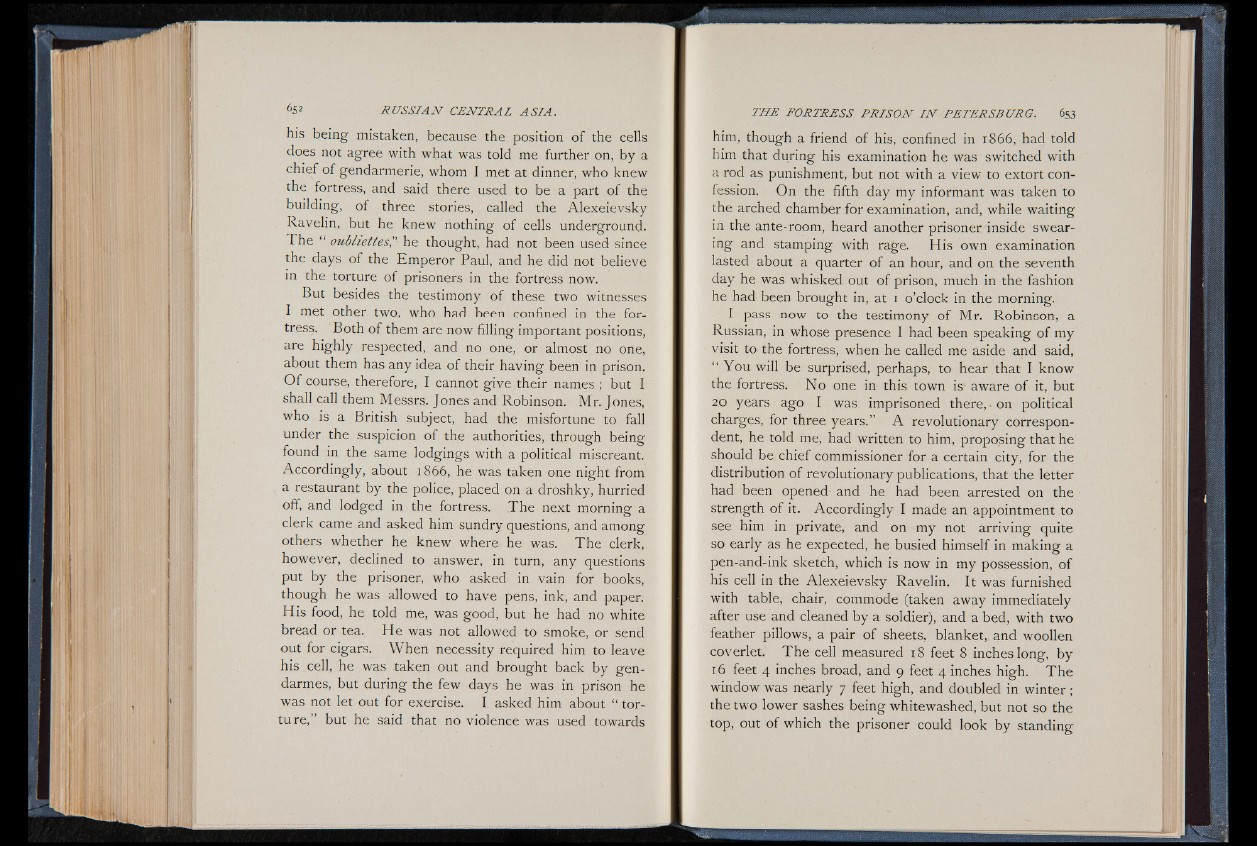
his being mistaken, because the position of the cells
does not agree with what was told me further on, by a
chief of gendarmerie, whom I met at dinner, who knew
the fortress, and said there used to be a part of the
building, of three stories, called the Alexeievsky
Ravelin, but he knew nothing of cells underground.
The “ oubliettes,” he thought, had not been used since
the days of the Emperor Paul, and he did not believe
in the torture of prisoners in the fortress now.
But besides the testimony of these two witnesses
I met other two, who had been confined in the fortress.
Both of them are now filling important positions,
are highly respected, and no one, or almost no one,
about them has any idea of their having been in prison.
O f course, therefore, I cannot give their names ; but I
shall call them Messrs. Jones and Robinson. Mr. Jones,
who is a British subject, had the misfortune to fall
under the suspicion of the authorities, through being
found in the same lodgings with a political miscreant.
Accordingly, about 1866, he was taken one night from
a restaurant by the police, placed on a droshky, hurried
off) and lodged in the fortress. The next morning a
clerk came and asked him sundry questions, and among
others whether he knew where he was. The clerk,
however, declined to answer, in turn, any questions
put by the prisoner, who asked in vain for books,
though he was allowed to have pens, ink, and paper.
His food, he told me, was good, but he had no white
bread or tea. He was not allowed to smoke, or send
out for cigars. When necessity required him to leave
his cell, he was taken out and brought back by gendarmes,
but during the few days he was in prison he
was not let out for exercise. I asked him about 1 tor-
ture,” but he said that no violence was used towards
him, though a friend of his, confined in 1866, had told
him that during his examination he was switched with
a rod as punishment, but not with a view to extort confession.
On the fifth day my informant was taken to
the arched chamber for examination, and, while waiting
in the ante-room, heard another prisoner inside swearing
and stamping with rage. His own examination
lasted about a quarter of an hour, and on the seventh
day he was whisked out of prison, much in the fashion
he had been brought in, at 1 o’clock in the morning.
I pass now to the testimony of Mr. Robinson, a
Russian, in whose presence I had been speaking of my
visit to the fortress, when he called me aside and said,
“ You will be surprised, perhaps, to hear that I know
the fortress. No one in this town iss aware of it, but
20 years ago I was imprisoned there, - on political
charges, for three years.” A revolutionary correspondent,
he told me, had written to him, proposing that he
should be chief commissioner for a certain city, for the
distribution of revolutionary publications, that the letter
had been opened and he had been arrested on the
strength of it. Accordingly I made an appointment to
see him in private, and on my not arriving quite
so early as he expected, he busied himself in making a
pen-and-ink sketch, which is now in my possession, of
his cell in the Alexeievsky Ravelin. It was furnished
with table, chair, commode (taken away immediately
after use and cleaned by a soldier), and a bed, with two
feather pillows, a pair of sheets, blanket, and woollen
coverlet. The cell measured 18 feet 8 inches long, by
16 feet 4 inches broad, and 9 feet 4 inches high. The
window was nearly 7 feet high, and doubled in winter ;
the two lower sashes being whitewashed, but not so the
top, out of which the prisoner could look by standing